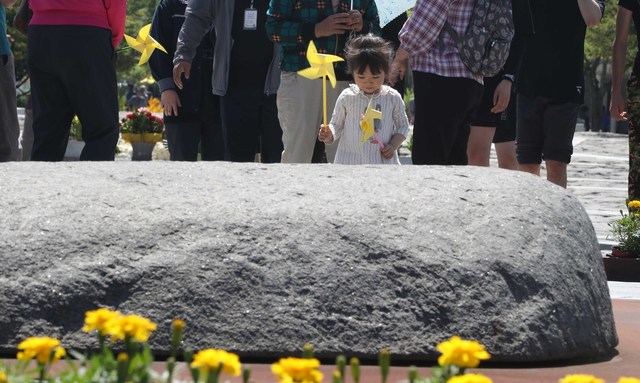Posted on : May.23,2019 15:48 KST
 |
|
Supporters in front of the grave of late former President Roh Moo-hyun on May 22, the even of the 10th anniversary of this death, in Bongha Village, South Gyeongsang Province. (Park Jong-shik, staff photographer)
|
Ten years have passed since countless Koreans mourned the devastating news of the death of former South Korean President Roh Moo-hyun on Saturday morning, May 23, 2009. At the end of his presidency, Roh had boarded a train bound for his hometown of Bongha Village, South Gyeongsang Province, determined to revitalize the area. But a muckraking investigation by prosecutors drove Roh to end his life. In his suicide note, he urged his supporters not to feel sorry for what he described as his destiny.
A lot can change in 10 years. After spending a season in the wilderness, Roh’s allies have returned to the corridors of power during the presidency of Moon Jae-in. In the parliamentary elections of 2016 and the regional elections of 2018, Democratic Party candidates made great strides not only in Busan, where “foolish Roh Moo-hyun,” as he called himself, suffered frequent defeats, but also in South Gyeongsang Province and Daegu, traditional conservative strongholds. Huge cracks have appeared in the walls of regionalism, just as Roh wanted.
The seeds of reconciliation and peaceful coexistence between South and North Korea were planted and watered by Roh and the previous president, Kim Dae-jung. Though their efforts were neglected during the nine years of Lee Myung-bak and Park Geun-hye’s presidencies, they are finally moving forward once again. The inter-Korean joint declaration that Roh helped orchestrate on Oct. 4, 2007, which contained a plan for a peace zone in the West Sea, among other things, was finally brought to fruition with Moon’s Panmunjom Declaration, on Apr. 27, 2018, and the signing of the Comprehensive Military Agreement on Sept. 19, 2018.
Korea still faces the challenges that Roh tried to tackle. There’s still a long way to go before Korea can realize cooperative governance and reform the electoral system so as to root out regionalism. In 2005, Roh called for a reform of the electoral system, promising to yield the authority for cabinet appointments to the party or coalition of parties with a majority of seats in the National Assembly. But the electoral reform that would end parties’ monopolization of power in specific regions and institutionalize cooperative governance through coalitions representing a wide range of minor parties has run into obstacles. Though the National Assembly has fast-tracked a bill that would implement a regional partial mixed-member proportional representational system, the Liberty Korea Party is resisting this change, which it calls a “plot by the left-wing dictatorship.”
Decentralizing political power and reforming powerful government agencies
Roh’s dream of decentralizing political power and alleviating Seoul’s lopsided influence through balanced development of the countryside has stalled. Since its incorporation in July 2012, Sejong City has gained a population of 330,000, and ten “innovative cities” have been established in various parts of the country. But recently, there have even been indications that the concentration of wealth and power in the capital region is growing once again. What’s needed at this moment is a bold decision to set up a branch of the National Assembly in Sejong City.
There has also been little progress in efforts to reform powerful government agencies, such as the prosecutors. While the National Intelligence Service has carried out organizational reforms to keep it out of domestic politics, a revision to the National Intelligence Service Act that would fundamentally prevent it from such political meddling is still pending at the National Assembly. Prosecutorial reform has been spelled out in a bill that would establish a body to investigate crime by high-ranking senior officials and another that would adjust the investigatory powers of the police and prosecutors, both of which have been designated for fast-track treatment by the ruling party and three opposition parties. (The Liberty Korea Party opposes the reforms.) But we should not be too optimistic about the future of these reforms, given overt pushback from prosecutors and apathy from lawmakers.
Conservative forces that resisted reform during Roh’s presidency are now attacking the Moon administration by citing Roh’s deployment of troops to Iraq and its conclusion of the Korea-US Free Trade Agreement as examples of pragmatism and cooperative governance. That’s a sophistic argument. Given Roh’s dream of a society without rule-breaking or special privileges, Roh’s legacy should be understood as the courage to topple vested interests and tackle the challenges of the day without flinching.
At 2 pm on May 23, the memorial service for the 10th anniversary of Roh’s passing will be held at the presidential gravesite in Bongha Village. It will be a time to recall Roh’s lament that he’d “wanted to be the vanguard of a new era but turned out to be the rear guard of an old era” and to reflect on the still unachieved dream of the practical progressive movement.
Please direct comments or questions to [english@hani.co.kr]






